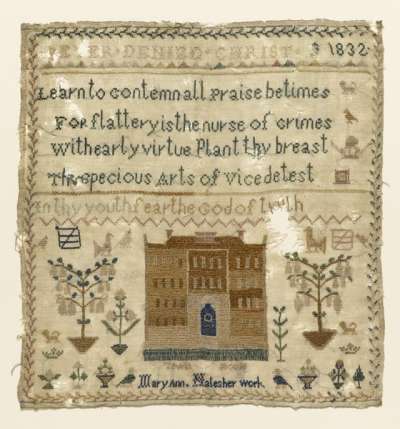Sampler
This sampler is mainly worked in cross-stitch, in silks on wool. A strong message comes across from this sampler, probably worked by a young child between the age of 7 and 10. The text recalls the well-known phrase ‘the devil makes work for idle hands’.
The working of alphabet, verse and numerical samplers were an essential part of a girl’s education. Needlework was a useful life skill. Children of all classes could practice the stitches and techniques needed to mark linen and cotton articles for the laundry. Tiny cross- stitch letters numbers and motifs were the most efficient way to label the family clothes to prevent loss and keep a count of what was to go in the weekly wash. Peers coronets were also worked so that girls going on to domestic service with an aristocratic family could add the motifs to bed and table linen, nightwear and undergarments.
Needlework was also seen as a key part of ‘good housewifery’ and industriousness a desirable virtue. A thrifty disposition, good organisation, neatness and hygiene were highly valued, and embroidery was a common past-time for middle and upper class women.
In addition to practical skills, the moral, warning tone of the religious verses embroidered were meant to instill god-fearing values in the child. Mary Ann would have spent many hours working on her sampler and those severe words ‘In thy youth fear the God of truth’.
The working of alphabet, verse and numerical samplers were an essential part of a girl’s education. Needlework was a useful life skill. Children of all classes could practice the stitches and techniques needed to mark linen and cotton articles for the laundry. Tiny cross- stitch letters numbers and motifs were the most efficient way to label the family clothes to prevent loss and keep a count of what was to go in the weekly wash. Peers coronets were also worked so that girls going on to domestic service with an aristocratic family could add the motifs to bed and table linen, nightwear and undergarments.
Needlework was also seen as a key part of ‘good housewifery’ and industriousness a desirable virtue. A thrifty disposition, good organisation, neatness and hygiene were highly valued, and embroidery was a common past-time for middle and upper class women.
In addition to practical skills, the moral, warning tone of the religious verses embroidered were meant to instill god-fearing values in the child. Mary Ann would have spent many hours working on her sampler and those severe words ‘In thy youth fear the God of truth’.
Object Summary
- Accession Loan No.
- 63/1962
- Category
- Decorative Art
- Collection Class
- Textiles and equipment
- Material
- woolsilk
- Common Name
- sampler
- Simple Name
- Sampler
- Period Classification
- William IV (1830-1837)
- Production Date
- 1832
- Production Person Initials
- Mary Ann
- Production Person Surname
- Hales


